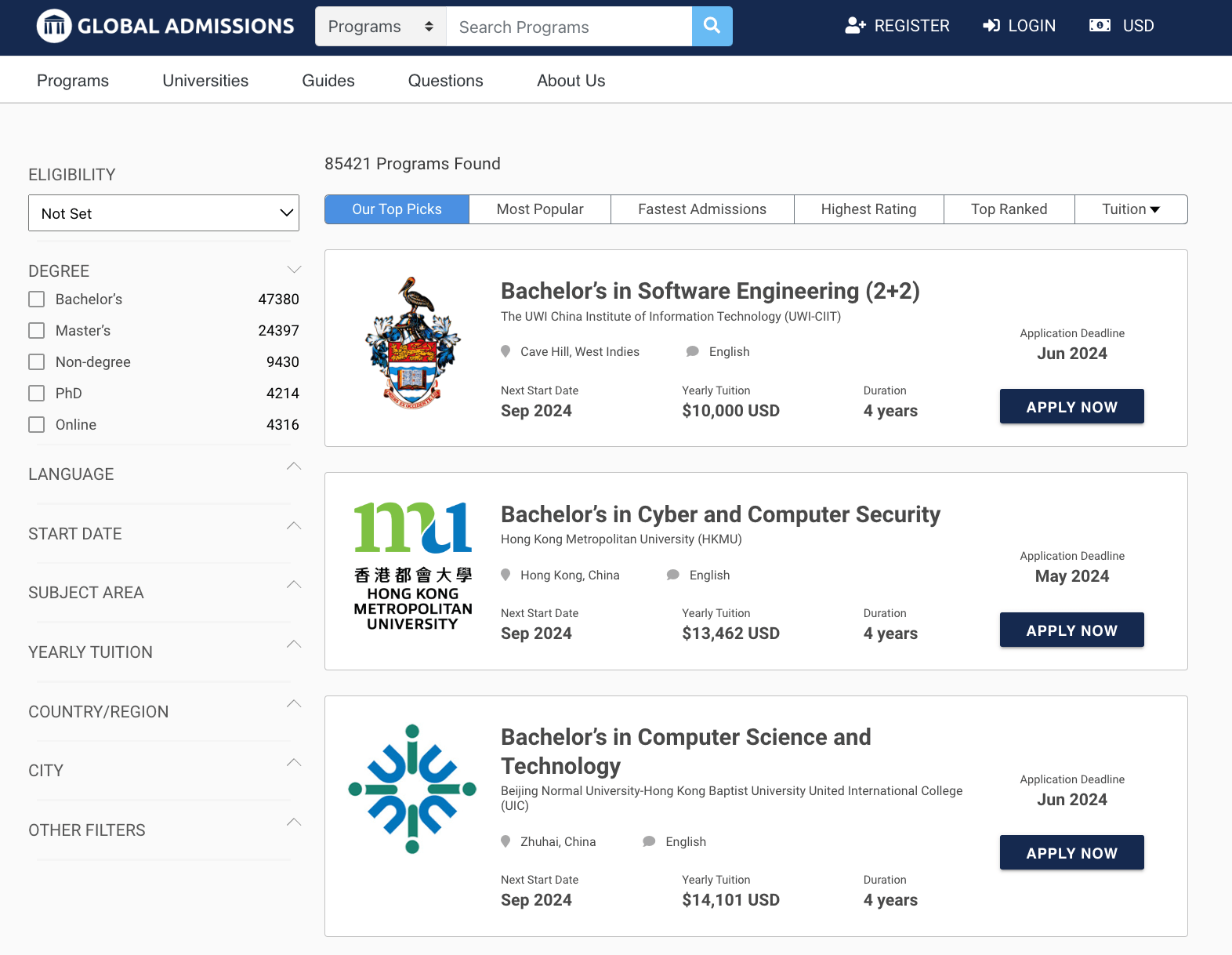Are you planning to study in Europe?
As CEO at Global Admissions I’ve put together this guide with tips on things you need to know before you study in Europe.
Studying in Europe offers a unique blend of world-class education, rich history, and diverse cultural experiences. If you’re planning to embark on this exciting journey, here are 100 things you need to know to make the most of your experience:
1. Pre-Departure Essentials
- Choose the Right Country: Consider language, culture, lifestyle, and education system.
- Select the Right University: Research rankings, programs, and campus facilities.
- Understand Visa Requirements: Each country has different rules; apply well in advance.
- Learn the Language: Even basic proficiency can greatly enhance your experience.
- Arrange Your Finances: Budget for tuition, accommodation, and living expenses.
- Look for Scholarships: Many European universities offer scholarships for international students.
- Secure Health Insurance: It’s mandatory for obtaining a student visa.
- Book Accommodations Early: Options range from university dorms to private rentals.
- Plan Your Travel: Look for student discounts on airfare.
- Pack Appropriately: Consider the climate and cultural norms.
2. Legal and Administrative
- Register Upon Arrival: Some countries require you to register with local authorities.
- Open a Bank Account: Essential for managing finances abroad.
- Understand the Tax System: Know if you need to file taxes while studying.
- Check Work Regulations: Some student visas allow part-time work.
- Renew Your Visa as Needed: Be aware of the expiry date and renewal process.
- Get a Local SIM Card: Staying connected is crucial.
- Know Your Rights as a Student and Tenant: Familiarize yourself with local laws.
3. Academic Life
- Attend Orientation Programs: Great for making friends and understanding university systems.
- Get to Know Your Professors: They can be valuable resources and mentors.
- Understand Academic Expectations: They can differ significantly from those in your home country.
- Utilize University Resources: Libraries, labs, and career services can enhance your success.
- Manage Your Time Well: Balance studies with social activities.
- Join Study Groups: Helps with difficult subjects and exams.
- Explore Exchange Opportunities: Some programs offer semesters at other European universities.
- Participate in Class: Engagement can be part of your grade.
- Respect Academic Integrity: Plagiarism rules are strictly enforced.
- Stay Organized: Keep track of assignments, deadlines, and exams.
4. Language and Communication
- Practice the Local Language Daily: Immersion is the best teacher.
- Use Language Apps: Tools like Duolingo or Babbel can be very helpful.
- Don’t Be Afraid to Make Mistakes: It’s part of the learning process.
- Watch Local Media: It’s great for language skills and understanding cultural nuances.
- Keep a Language Diary: Helps track your progress and vocabulary.
5. Social Integration
- Explore the Local Culture: Museums, theaters, and concerts offer great insights.
- Make Local Friends: They can teach you about the culture and help with language skills.
- Join Clubs and Societies: Great for meeting people with similar interests.
- Attend University Events: Workshops, talks, and parties can enhance your experience.
- Travel Within the Country: Understand different regions and their unique cultures.
- Celebrate Local Festivals: They offer a fun way to learn about the culture.
- Volunteer: A rewarding way to meet people and improve language skills.
- Stay Open and Adaptable: Embrace new experiences and perspectives.
6. Daily Life
- Learn to Cook Local Recipes: Saves money and impresses new friends.
- Shop at Local Markets: Fresh produce and local flavors are usually cheaper.
- Understand Public Transportation: It’s often the easiest way to get around.
- Stay Healthy: Join a gym or find local sports activities.
- Respect Public Etiquette: Be aware of local customs and behaviors.
- Manage Homesickness: Stay in touch with family and friends back home.
- Find a Balance: Don’t overcommit yourself; leisure is important.
- Keep a Budget: Track your spending to avoid financial stress.
- Seek Support When Needed: Most universities offer counseling services.
- Explore Your Surroundings: Every corner of Europe holds history and charm.
7. Traveling Around Europe
- Take Advantage of Student Discounts: For rail and air travel.
- Use Interrail or Eurail Passes: Cost-effective for extensive travel.
- Plan Weekend Trips: Explore nearby countries and cities.
- Stay in Youth Hostels: Affordable and great for meeting other travelers.
- Travel Light: Many European airlines have strict luggage policies.
- Learn Local Travel Etiquette: Such as reserving seats in advance.
- Use Ride-Sharing Apps: They can be cheaper than traditional taxis.
- Explore Off the Beaten Path: Discover lesser-known towns and regions.
- Keep Safety in Mind: Always be aware of your surroundings, especially at night.
- Document Your Travels: Keep a blog or a journal of your adventures.
8. Managing Finances
- Use a Budget App: Keep track of your expenses digitally.
- Avoid Dynamic Currency Conversion: Choose to pay in the local currency.
- Watch for Hidden Bank Fees: Especially with international transactions.
- Cook at Home: Eating out frequently can quickly deplete your budget.
- Take Part-time Jobs: If permitted, to supplement your income.
- Shop Second-hand: Buy used books, clothes, and furniture.
- Avoid Impulse Purchases: Stick to your shopping list.
- Learn to Bargain: In markets where it’s acceptable.
- Use Student Discounts: For cinemas, museums, and events.
- Plan Major Purchases: Take advantage of sales seasons.
9. Health and Wellness
- Register with a Local Doctor: Know where to go in case of illness.
- Understand How to Purchase Medications: Pharmacies might operate differently.
- Maintain a Regular Exercise Routine: Join a local gym or sports club.
- Eat Balanced Meals: Don’t rely solely on fast food.
- Be Mindful of Mental Health: Utilize university resources if you feel overwhelmed.
- Practice Relaxation Techniques: Like meditation or yoga.
- Stay Hydrated and Rested: Especially during travel.
- Follow Local Health Guidelines: Particularly in times of public health concerns.
- Get Regular Health Check-ups: Don’t neglect your physical health.
- Know Allergy Information: Especially if dining out in new places.
10. Cultural Adaptation
- Embrace Local Traditions: Participate in customs and celebrations.
- Read Local News: Stay informed about what’s happening around you.
- Avoid Cultural Faux Pas: Learn what might be considered rude or inappropriate.
- Appreciate Local Art and Music: Deepen your cultural appreciation.
- Take Cultural Sensitivity Seriously: Respect differences in values and beliefs.
- Learn the History: Understanding the past can enrich your present experience.
- Watch Local Films and Read Books: Helps with language and cultural understanding.
- Be Patient With Yourself: Cultural adaptation can take time.
- Engage in Local Politics and Issues: If appropriate, it can provide deeper insights.
- Celebrate Your Own Traditions: Share your culture with new friends.
11. Post-Study Considerations
- Consider Work Opportunities: Look for job possibilities in your host country.
- Think About Further Education: Maybe another degree in Europe?
- Maintain Connections: Keep in touch with friends and professional contacts.
- Evaluate Your Experience: Reflect on how studying abroad has changed you.
- Plan Your Return Home: Consider what you’ll need to readjust.
- Share Your Experience: Help future students by sharing tips.
- Update Your CV: Highlight your international experience and new skills.
- Consider Staying Abroad: Some find career opportunities or even settle permanently.
- Convert Short-term Contacts into Long-term Relationships: Networking is key.
- Keep Exploring: Let your study abroad experience inspire a lifetime of curiosity and learning.
These 100 tips cover the gamut of preparing for, enjoying, and making the most of your time studying in Europe. From logistical preparations to cultural immersion, managing finances to personal growth, each point will help ensure that your European educational adventure is as rich and fulfilling as possible.
Helpful Resources for Studying in Europe

- Global Admissions: Provides a platform where students can explore and apply to universities across Europe. Offers detailed guides on courses, visa requirements, and how to adapt to European life.
- Study in Europe: Official EU website that provides information about higher education in Europe, covering scholarships, university systems, and detailed guides for studying in each member country.
- Erasmus+: The EU’s programme to support education, training, youth and sport in Europe. It offers a range of opportunities for students to study across the EU through scholarships and exchanges.
- EUNiCAS: Enables students to apply directly to degree programmes taught through English, in universities across Europe.
- DAAD (German Academic Exchange Service): A major resource for students wishing to study in Germany, offering scholarship opportunities and guidance.
- Campus France: The French government agency for promoting higher education and managing the reception and international mobility of students, researchers, experts, and guests.
- Study in Scandinavia: Dedicated to higher education in Scandinavian countries, offering information about universities and practical advice for students.
- Chevening: The UK government’s global scholarship program, offering scholarships to students with leadership qualities from over 160 countries and territories to study in the UK.
These resources offer comprehensive support for students looking to navigate the complexities of studying in Europe, providing everything from application procedures to insights on living and studying in specific European countries.
